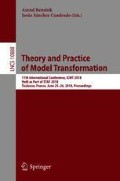Abstract
Model transformations (MT), as with any other software artifact, may contain quality flaws. Even if a transformation is functionally correct, such flaws will impair maintenance activities such as enhancement and porting. The concept of technical debt (TD) models the impact of such flaws as a burden carried by the software which must either be settled in a ‘lump sum’ to eradicate the flaw, or paid in the ongoing additional costs of maintaining the software with the flaw. In this paper we investigate the characteristics of technical debt in model transformations, analysing a range of MT cases in different MT languages, and using measures of quality flaws or ‘bad smells’ for MT, adapted from code measures.
Based on these measures we identify significant differences in the level and kinds of technical debt in different MT languages, and we propose ways in which TD can be reduced.
Access this chapter
Tax calculation will be finalised at checkout
Purchases are for personal use only
References
van Amstel, M., Bosems, S., Kurtev, I., Ferreira Pires, L.: Performance in model transformations: experiments with ATL and QVT. In: Cabot, J., Visser, E. (eds.) ICMT 2011. LNCS, vol. 6707, pp. 198–212. Springer, Heidelberg (2011). https://doi.org/10.1007/978-3-642-21732-6_14
van Amstel, M., van den Brand, M.: Using metrics for assessing the quality of ATL model transformations. In: MtATL 2011 (2011)
Arendt, T., Taentzer, G.: UML model smells and model refactorings in early software development phases. Technical report FB 12. Philipps Universitat, Marburg (2010)
Basili, V.: Software modeling and measurement: the goal/question/metric paradigm (1992)
Batot, E., Sahraoui, H., Syriani, E., Molins, P., Sboui, W.: Systematic mapping study of model transformations for concrete problems. In: Modelsward 2016, pp. 176–183 (2016)
Correa, A., Werner, C.: Refactoring OCL specifications. SoSyM 6, 113–138 (2007)
He, X., Avgeriou, P., Liang, P., Li, Z.: Technical debt in MDE: a case study on GMF/EMF-based projects. In: MODELS 2016 (2016)
IEC/ISO, 25010 Systems and software engineering - systems and software quality models (2011)
Kapová, L., Goldschmidt, T., Becker, S., Henss, J.: Evaluating maintainability with code metrics for model-to-model transformations. In: Heineman, G.T., Kofron, J., Plasil, F. (eds.) QoSA 2010. LNCS, vol. 6093, pp. 151–166. Springer, Heidelberg (2010). https://doi.org/10.1007/978-3-642-13821-8_12
Lano, K., Kolahdouz-Rahimi, S., Yassipour-Tehrani, S.: Solving the CRA case using UML-RSDS. In: TTC 2016 (2016)
Lano, K., et al.: Translating from UML-RSDS OCL to ANSI C. In: OCL 2017 (2017)
Lucio, L., Amrani, M., Dingel, J., Lambers, L., Salay, R., Selim, G., Syriani, E., Wimmer, M.: Model transformation intents and their properties. SoSyM 15, 647–684 (2016)
Macedo, N., Cunha, A.: Least-change bidirectional model transformation with QVT-R and ATL. SoSyM 15, 783–810 (2016)
Marinescu, R.: Assessing technical debt by identifying design flaws in software systems. IBM J. Res. Dev. 56(5), 9:1–9:13 (2012)
Struber, D., Ploger, J., Acretoaie, V.: Clone detection for graph-based MT languages. In: ICMT 2016 (2016)
Wagelaar, D.: Composition techniques for rule-based MT languages. In: ICMT 2008 (2008)
Weatherill, G.B.: Elementary Statistical Methods. Chapman and Hall, London (1978)
Wimmer, M., et al.: A Catalogue of Refactorings for model-to-model transformations. J. Object Technol. 11(2), 1–40 (2012)
Author information
Authors and Affiliations
Corresponding author
Editor information
Editors and Affiliations
Rights and permissions
Copyright information
© 2018 Springer International Publishing AG, part of Springer Nature
About this paper
Cite this paper
Lano, K., Kolahdouz-Rahimi, S., Sharbaf, M., Alfraihi, H. (2018). Technical Debt in Model Transformation Specifications. In: Rensink, A., Sánchez Cuadrado, J. (eds) Theory and Practice of Model Transformation. ICMT 2018. Lecture Notes in Computer Science(), vol 10888. Springer, Cham. https://doi.org/10.1007/978-3-319-93317-7_6
Download citation
DOI: https://doi.org/10.1007/978-3-319-93317-7_6
Published:
Publisher Name: Springer, Cham
Print ISBN: 978-3-319-93316-0
Online ISBN: 978-3-319-93317-7
eBook Packages: Computer ScienceComputer Science (R0)

